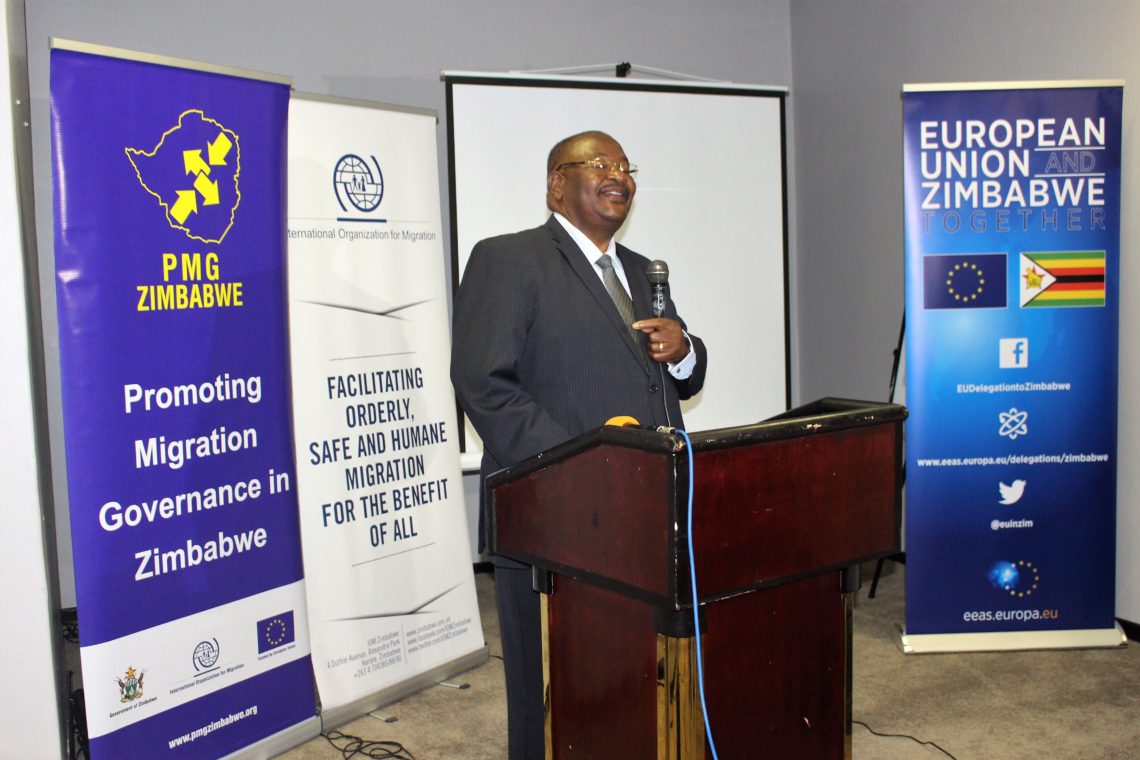By Byron Mutingwende
The Anti-Trafficking Inter-Ministerial Committee (ATIMC) capacity building workshop held in Harare recently is a sign that Zimbabwe is committed to addressing human trafficking.
In his keynote address while officially opening the workshop, Obert Mpofu, the Minister of Home Affairs said it was imperative to have a national-driven response to the heinous crime of human trafficking.
“Section 9. 3 of the Zimbabwe Trafficking in Persons (TIP) Act calls for the implementation of appropriate measures to adopt or comply with international and regional developments and standards in the prevention and combating of trafficking in persons and the setting up of a national plan of action against trafficking in persons,” Mpofu said.
Mpofu said the workshop was to unpack the purposes and roles of ATIMC, learning from global best practice. He added that it was meant to increase the capacity to monitor and report the implementation of anti-TIP policies and legislation. The training was meant to give a communication and cooperation platform among the national, regional and international actors in the fight against trafficking in persons.
The ATIMC has developed the first National Plan of Action for 2016 – 2018, which is an implementation tool of the Trafficking in Persons Act and bears the frame of reference to the National Trafficking in Persons response strategy that is in sync with international best practices.
Greenwell Lyempe, the Regional Capacity Building Officer of the United Nations Office on Drugs and Crime (UNODC) said it was critical to strengthen of the functionality of the Anti-Trafficking Inter-Ministerial Committee through capacity building.
“The UNODC, in close partnership with IOM and SADC has worked with Anti-Trafficking Inter-Ministerial Committee since its appointment, notably in development of the country’s National Action Plan on Trafficking in Persons in establishment of operational taskforces at provincial level, in national
awareness raising activities, and also in strategising on the response to individual cases of trafficking in persons as they emerged,” Lyempe said.
The ATIMC has organised various capacity building activities for key stakeholders, awareness raising activities for the general public, victim assistance measures especially when the Kuwait crisis emerged, as well as investigations and on-going prosecutions of TIP cases coordinated by the AT-IMC.
“It has been a privilege for UNODC to accompany you on this journey, providing support as required, and we continue to avail ourselves as partners of the government of Zimbabwe in the fight against trafficking in persons. Trafficking in persons remains a serious global crime affecting nearly every country in the world as source, destination or transit countries. It is fuelled by economic, social, cultural and political conditions creating vulnerabilities that make men, women and children easy targets for criminals who aim to exploit their vulnerabilities.”
It was revealed that children are particularly vulnerable due to their lack of experience and propensity to trust easily, and the 2016 UN Global Report on trafficking in persons confirmed that 64% of victims in Sub-Saharan Africa are children. In most societies women are also particularly vulnerable due to gender inequality in access to education, work opportunities, human and social rights.
The UN official said trafficking in persons by its nature requires an inter-sectoral coordinated response if it is to be effective – no department can single-handedly address these kinds of cases on their own.
“Because it is a crime, a criminal justice response is critical. There might be money-laundering, so financial intelligence units are important too. It might be transnational in nature so immigration and foreign affairs are required. There are vulnerable groups involved so social welfare is critical. The list goes on.”
Daniel Sam, the Programme Manager of the International Organisation for Migration (IOM) Zimbabwe said the UN body has been working with the government of Zimbabwe at different levels on countering human trafficking because it recognises that everyone has a crucial role to play in addressing the problem.
The Global Plan of Action to Combat Trafficking in Persons adopted by the UN General Assembly on 30 July 2010 calls upon policy makers to be a part of an integrated and multidisciplinary approach to fight human trafficking.
“The International Organisation for Migration (IOM) and the United Nations Office on Drugs and Crime (UNODC) have had a long-standing good cooperation with the government of Zimbabwe in the national response to combat trafficking in persons (TIP). The cooperation has led to some key achievements; The two agencies worked together with the Government of Zimbabwe in strengthening the capacity of the relevant government institutions to address TIP by successfully lobbying for the enactment of the TIP Act in 2014; holding workshops in respect of other anti-TIP issues targeted at various stakeholders in government; supporting the institutionalization of structures within government to address TIP as well as increasing the awareness raising on TIP amongst various stakeholders and the public in general,” Sam said
After the enactment of the TIP Act in 2014, the government of Zimbabwe developed a National Plan of Action on TIP (NAPLAC), with technical assistance of the above-mentioned entities, which was launched on the 29 July 2016.
